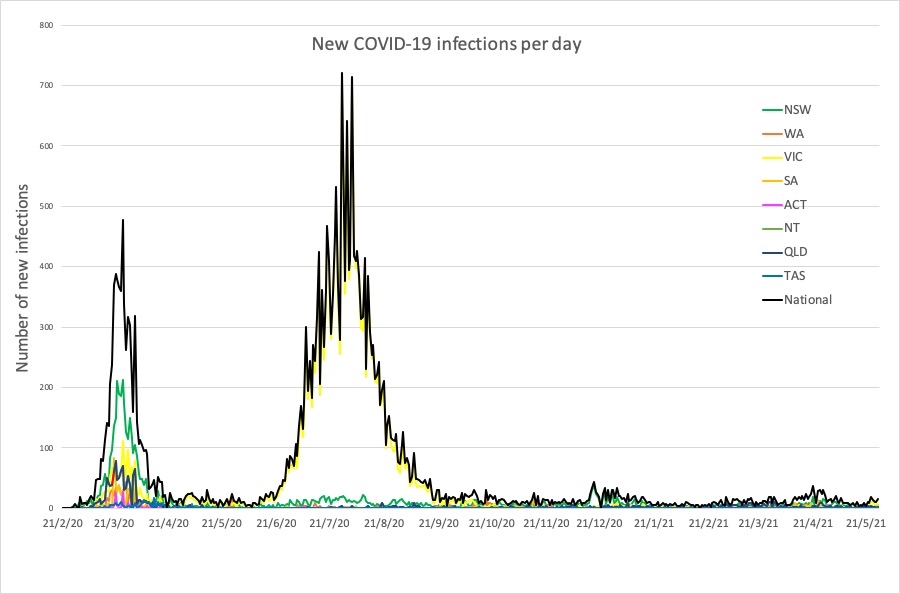And compliance with stay-at-home orders may be associated with greater household income and education levels.
Welcome to The Medical Republic’s COVID Catch-Up.
It’s the day’s covid-19 news in one convenient post. Email bianca@biancanogrady.com with any tips, comments or feedback.
31 May
- Study finds greater immune response to Pfizer vaccine in 12-15-year-olds compared to young adults.
- Compliance with stay-at-home orders associated with higher household wealth and education levels.
- NSW breaks its own record for most covid-19 vaccines administered in one week.
- Two staff members and one resident of Victorian aged care facility test positive.
- Latest covid-19 infection numbers from around Australia.
Adolescents show an even stronger immune response to the Pfizer/BioNTech vaccine than young adults, according to a paper published in the New England Journal of Medicine.
The study randomised 2260 adolescents aged 12-15 years either to the Pfizer/BioNTech vaccine or placebo, and compared their immune response to that seen in those aged 16-25 years.
The most common side effects were headache and fatigue, and 20% of participants aged 12-15 years reported fever after the injection, but there were no severe adverse events attributed to the vaccine.
Adolescents showed significantly higher levels of neutralising antibodies to SARS-CoV-2 than did the 16-25-year-olds, and the vaccine showed 100% efficacy at preventing symptomatic infection after the second dose.
“Given the observed immunogenicity and efficacy, it is likely that vaccination will also prevent asymptomatic infection in children, thereby broadening community protection,” the authors wrote.
Individuals living in wealthier households are more able to comply with stay-at-home orders, say the authors of a study published in the Annals of the American Association of Geographers.
The study made use of mobile phone location data to track the movements of nearly 60,000 anonymous mobile devices in 12 metropolitan areas across the US, and correlated those movements with demographic and socioeconomic variables for each ‘census block group’ – a small number of households clustered together in the census – within those areas.
The analysis revealed that household groups with a higher income or more individuals of higher income were more likely to spent more time at home during lockdown periods. A similar association was seen between compliance with stay-at-home orders and higher levels of education.
The authors commented that this highlighted the ‘luxury’ nature of stay-at-home orders, because lower income households and individuals are less able to afford to comply with them, which also meant they were likely to experience greater exposure to covid-19.
“Such disparate exposure to vulnerable populations can further compound other disadvantages, such as underlying comorbidities, poor access to and low utilization of high-quality health care, and limited access to COVID-19 testing centers, further causing negative health outcomes for the vulnerable populations,” they wrote.
New South Wales set a new state record for the most covid-19 vaccines delivered in a week, with just over 73,600 residents rocking up to get vaccinated. Nearly 32,000 of those doses were administered at the Olympic Park vaccination facility alone.
Nationally as of 29 May, 4.21 million doses have been administered around the country.
A staff member at the Arcare Maidstone residential aged care facility tested positive for covid-19 yesterday, and today one resident and another staff member also tested positive.
The resident – a 90-year-old woman – had received her first dose of the Pfizer vaccine nearly two weeks ago, and was due for her second dose tomorrow, according to ABC News.
Victoria’s outbreak now numbers 50 cases in total.
Here are the latest COVID-19 infection numbers from around Australia to 9pm Sunday:
National – 30,098 with 910 deaths
ACT – 124 (0)
NSW – 5585 (5)
NT – 173 (0)
QLD – 1618 (2)
SA – 754 (2)
TAS – 234 (0)
VIC – 20,593 (6)
WA – 1017 (0)



